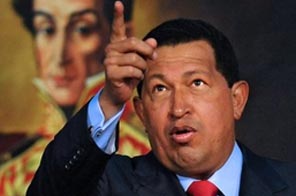Venezuela seizes three banks, two others closed
CARACAS: The Venezuelan government of Hugo Chavez seized three banks and ordered two other financial institutions closed, as the country reeled from a currency devaluation he hopes will improving cratering state finances.
"In order to guarantee a healthy national banking and financial system, the board... has decided to intervene (with regard to) the following firms: InverUnion Banco Comercial; Banco Del Sol; and Mi Casa," banking regulator Sudeban said in a statement.
The closures come despite warnings that now regular business seizures could further spook foreign investors and undermine Chavez's efforts to put state revenues on a solid footing.
The nationalization of eight small- and medium-sized institutions last year prompted fears of a run on the country's banks, as investors moved to withdraw funds. It also sparked a dip in Venezuelan bonds and the country's currency in free trading.
The banking regulator defended Monday's move as a boost to the sector's stability, claiming the three seized banks were facing "serious administrative and managerial problems that resulted in insufficient liquidity to cover their short-term obligations."
Sudeban also closed down investment bank Baninvest and Banco Real Banco de Desarrollo, "due to inefficient operations" and announced that the banks' clients would not have immediate access to their deposits.
The government currently controls around 25 percent of the banking sector, largely due to the purchase of the Banco de Venezuela from the Spain's Santander group in 2009.
Venezuela's National Assembly on December 15 passed a banking reform law giving the state more power to regulate the sector, a move that coincided with Chavez's drive to revamp national finances, with an eye on legislative elections next year, observers said.
Supporters of Chavez had faced a tough fight at the polls, as the government saw its ability to woo supporters with popular spending programs curbed by evaporating state revenue.
In an effort to increase oil revenue Chavez earlier this month announced the bolivar would trade at 4.30 against the dollar for "non-essential" goods -- double the previous rate -- and a rate of 2.60 bolivars against the dollar for basic goods.
The Venezuelan military then moved to shutter 70 firms, including a European-backed supermarket, amid panic buying by customers who feared imminent price hikes.
The currency move is already being felt by firms exporting to Venezuela. Goodyear, a US tire company, on Monday said the devaluation would cost it 150 million dollars in the first three months of this year.






